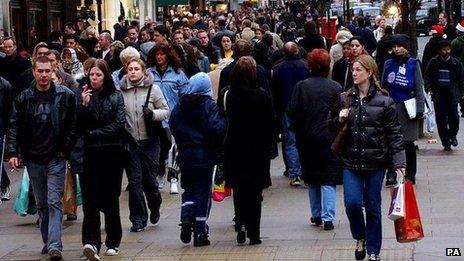2011 Census: Changing lifestyles in England and Wales
- Published

The 2011 Census offers an insight into changes in England and Wales
Among the mountain of statistics and crunched numbers to be found in the 2011 Census, lies telling detail of the life and habits of those living in England and Wales today.
Rows and rows of numbers, carefully compiled by the Office of National Statistics, , externalcan look like something from the Matrix science-fiction movies.
But what they reveal is that more people are renting homes than buying, more households have cars, and there are more people who have never been married.
They also suggest people are becoming more educated, with more getting degrees or similarly high levels of education.
Home ownership - either with a mortgage or loan, or outright - has decreased since 2001, when the previous census was conducted, currently standing at 14.7 million households, down from 14.9 million.
And the proportion of people renting from a private landlord or letting agency increased from 9% (1.9 million) in 2001 to 15% (3.6 million) in 2011.
Chris Norris, of the National Landlords Association, says: "There has been a huge shift in the make-up of the UK housing market.
"Social housing provision is in decline and access to mortgage finance has become increasingly difficult for a large proportion of households, particularly in the south-west of England, contributing to unprecedented demand for good quality rental property.
"Fifteen years ago private renting was synonymous with specific types of predominantly young households.
"Today, more and more families are finding their housing needs are best met by private landlords."
Social changes
What about sharing your home with a husband or wife? Not easy, according to these statistics, as the proportion of people who have never married has risen from 30% (12.5 million) to 35% (15.7 million).
Mary Balfour, of the Drawing Down The Moon introduction agency, says it is "much more difficult" than ever before to meet people.
"People stay at home more than ever, as with so much technology around they don't need to go out," she says.
"Pubs are closing, and people can't always afford to socialise, and lifestyles have changed.
"These days there are many online sites where you can meet a partner, but people get put off because they don't know how to manage it.
"Also, a lot of people lie about themselves online - not out of any malicious intent, but through wishing to appear more attractive."
The number of cars and vans available for use by households in England and Wales increased from 23.9 million to 27.3 million between 2001 and 2011. In 2001 there were, on average, 11 cars per 10 households, while in 2011 there were 12.
Prof Stephen Glaister, director of the RAC Foundation, says these figure are unsurprising.
"Our own work shows car and van ownership has spread across the social spectrum and the biggest growth is amongst those on the lowest incomes," he says.
"The bigger question is not how many people have access to a vehicle but how many miles are they doing in them.
"The recession has knocked back the volume of traffic - but prior to the economic downturn, private car use was essentially rising across all areas of the country except London, led by a surge in female drivers."
Attitude shift
In 2011 there were 12.4 million people (27%) educated to degree level or above. In 2001, that figure stood at 7.4 million.
Nicola Dandridge, chief executive of Universities UK, says that, in the UK, occupations requiring a degree will continue to grow over the next decade.
"Over this [census] period, the increase in degree-level qualifications has been driven by demand from employers and also by people recognising the long-term benefits of gaining a degree.
"The kinds of skills that higher education provides - the ability to think critically and to analyse and present evidence - are going to be increasingly in demand as our economy continues to shift."
Education is spreading, then, but what about faith? How tight is the nation's grip on its religious convictions?
All religions, except for Christianity, have increased in popularity from 2001, with Muslims going up by two percentage points to 1.5 million. The number of Christians decreased to 33.2 million in 2011 from 37.3 million in 2001.
And the proportion of people with no religious affiliation increased from 15% (7.7 million) to 25% (14.1 million).
Terry Sanderson, president of the National Secular Society, says the fall in the number of Christians showed a "huge upheaval" in attitudes towards religion.
"It should serve as a warning to the church that their increasingly conservative attitudes are not playing well with the public at large," he says.
But Nick Spencer, research director at Theos, the public theology think tank, says: "These figures show that we have a plural religious landscape, but that doesn't mean we're atheists.
"Digging deeper, we see that even those who say they have no religion often have a variety of spiritual beliefs, but they don't want to associate these to religious institutions."
Mr Spencer also says religion is "difficult to define and difficult to measure" - not unlike the feat of recording the lives of people in England and Wales.